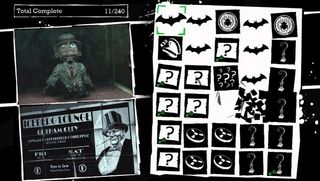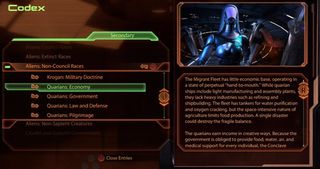End of forced metaphor. What we’re trying to say is that sometimes copying your competitors is okay, even admirable – especially when your competitors are the bar-raising, standard-setting, envelope-pushing geniuses at places like Nintendo, Valve, Rockstar and BioWare. Gamers won’t care or complain if you shamelessly rip off better ideas, as long as that means an industry full of better games. So steal away! Here’s a cheat sheet to get you started...
Contributor: Henry Gilbert
Uncharted
What every game should copy: The cutscene direction
It’s tempting to assume that Uncharted boasts the best cutscenes in all of gaming because of superior motion capture, superior graphics or superior acting. Watch any of the behind-the-scenes featurettes included with Drake’s Fortune or Among Thieves, however, and you’ll discover that developer Naughty Dog’s real secret to success is something much less obvious: a commitment to theatrical tradition that’s equally as strong as the love for technology.
Performers aren’t recorded in different voice booths across different days, weeks or months. They’re together in the same room, playing off each other physically and emotionally after extensive rehearsal time. Directors aren’t worried only about how the sequence will look when transplanted to a digital jungle or temple. They approach each cutscene as if it were a miniature play in front of a live audience that has to work dramatically without any extra bells or whistles. Writers aren’t checking off lines in a finished script. They’re encouraging Nolan North et al. to improvise and offer input, then reshaping the narrative whenever an unexpectedly amazing moment emerges.
This marriage of new and old – of fancy gadgets with proven stagecraft – is what sets Uncharted’s cinematic storytelling apart, and what every competitor needs to copy.
It’s tempting to assume that Uncharted boasts the best cutscenes in all of gaming because of superior motion capture, superior graphics or superior acting. Watch any of the behind-the-scenes featurettes included with Drake’s Fortune or Among Thieves, however, and you’ll discover that developer Naughty Dog’s real secret to success is something much less obvious: a commitment to theatrical tradition that’s equally as strong as the love for technology.
Performers aren’t recorded in different voice booths across different days, weeks or months. They’re together in the same room, playing off each other physically and emotionally after extensive rehearsal time. Directors aren’t worried only about how the sequence will look when transplanted to a digital jungle or temple. They approach each cutscene as if it were a miniature play in front of a live audience that has to work dramatically without any extra bells or whistles. Writers aren’t checking off lines in a finished script. They’re encouraging Nolan North et al. to improvise and offer input, then reshaping the narrative whenever an unexpectedly amazing moment emerges.
This marriage of new and old – of fancy gadgets with proven stagecraft – is what sets Uncharted’s cinematic storytelling apart, and what every competitor needs to copy.
Dead Space
What every game should copy: The seamless HUD

Gaming’s greatest appeal is escapism – the chance to totally lose yourself in another world and another life. That can be difficult to do, however, when the screen – your looking glass entrance to this alternate existence – is cluttered with constant and clumsy reminders that what you’re experiencing is contrived. Health meters. Ammo counts. Mini maps. Inventory. All break the illusion.
But they wouldn’t have to if more games followed Dead Space’s example and seamlessly blended that information (which is usually necessary) into the character’s reality. You know that Isaac Clarke is low on ammo for the same reason that he knows he’s low on ammo – because both of you can see the counter projected by his in-game weapon. You don’t have your own separate menus for map and inventory – you simply peek over Isaac’s shoulder as he opens up his map and inventory.
Obviously, Dead Space has the advantage of a sci-fi setting in which floating holograms can pop up whenever and wherever. With enough creativity, though – like the detective’s journal in L.A. Noire or the audio cues in King Kong – any game of any genre should be able to suspend disbelief. The less HUD, the more immersion.
Batman: Arkham Asylum
What every game should copy: The meaningful collectibles

Collectibles are usually added to a game for one or more of the following reasons: to artificially pad the perceived length of the game, to offer the cheap psychological thrill that comes from hoarding useless stuff or to prevent 100% of the players from earning 100% of the Achievements and Trophies.
By contrast, here are the reasons Arkham Asylum includes collectibles: to flesh out the main story with character profiles and interviews, to reward diehard fans with extra mementos from the dozens of Gotham citizens who couldn’t have appeared otherwise while simultaneously educating less familiar fans on the fascinating lore and history of Batman’s universe and to give players an opportunity to play not just as the face-punching Caped Crusader, but also as the puzzle-solving World’s Greatest Detective.
Most impressively, and most unusually, the collectibles make absolute sense within the game’s parameters. Why is Alan Wake picking up abandoned coffee thermoses in the forest? Why must Banjo and Kazooie hunt down puzzle pieces, musical notes, mystery eggs and honeycombs? No fucking clue. Why is Batman taking the time to track down Riddler? BECAUSE HE’S BATMAN.
Mass Effect
What every game should copy: The fully realized universe

Many games seem to make up their mythologies as they go along, writing the rules of their universes only when forced to by the events of each new game, or worse, leaving the authors of companion novels and comic books to fill in all the blanks. Curious how Master Chief was created in Halo? Oh, that answer exists – you just have to read 416 pages of Halo: The Fall of Reach to find out.
The Mass Effect franchise includes plenty of brand-extending adaptations, too, but they aren’t necessary to understand what’s going on in the world of the games themselves. Are you interested in learning about the Asari’s religion, the Krogans’ politics, the Drell’s biology, the Turians’ military protocol or the Salarians’ mating rituals? Open the Codex. Do you want a complete, date-by-date history of the Citadel Council or Systems Alliance? Open the Codex. Who qualifies as an N7? Open the Codex. Why does medi-gel work? Open the Codex. What powers the Normandy? Open the Codex. How do people in the future type on those little holographic keyboards that float in midair? Seriously, even that is fully explained by Mass Effect’s Codex.
BioWare has already answered every question you might ask and conveniently placed that encyclopedia of information directly in the main menu. Take note, competitors – your fans shouldn’t be charged, or left confused, when they try to dig deeper.

